Helpful Score: 2
Jay Winik's in depth analysis of the mid 19th century American geo-political landscape and the events and momentous decisions by a few men,in April 1865, North and South, that helped forge and solidify the nation was both interesting and enlightening. If you like history, it is great reading.
Helpful Score: 2
This is a great book about the end of the Civil War...One month in 1865 witnessed the frenzied fall of Richmond, a daring last-ditch Southern plan for guerrilla warfare, Lee's harrowing retreat, and then, Appomattox. It saw Lincoln's assassination just five days later and a near-successful plot to decapitate the Union government, followed by chaos and coup fears in the North, collapsed negotiations and continued bloodshed in the South, and finally, the start of national reconciliation.
Helpful Score: 2
This is one of the most well written and interesting books I have ever read. While its main theme is the confluence of major events in April, 1865, it is historical in many other respects, and it gives excellant descriptions of all of the main characters in the Civil War. A must read!
Helpful Score: 1
Well, his major premise is that this was the fulcrum month, the US was actually forged as a united nation, when it could have dissolved into guerrilla war and chaos. Somehow, he doesn't have enough hard information to make his case convincingly, and it ends up being a rather metaphysical argument. He spends a fair amount of time reviewing US history before the Civil War, and a fair amount after, which is interesting, but I wish he would have stayed a bit more on point, since it is a rather short book.
Beautiful Gift book.
One month in 1865 witnessed the frenzied fall of Richmond, a daring last-ditch Southern plan for guerrilla warfare, Lee's harrowing retreat, and then, Appomattox. It saw Lincoln's assassination just five days later and a near-successful plot to decapitate the Union government, followed by chaos and coup fears in the North, collapsed negotiations and continued bloodshed in the South, and finally, the start of national reconciliation.
In the end, April 1865 emerged as not just the tale of the war's official end, but the story of the making of our nation.
Jay Winik offers a brilliant new look at the Civil War's final days that will forever change the way we see the war's end and the nation's new beginning. Uniquely set within the larger sweep of history, and filled with rich profiles of outsize figures, fresh iconoclastic scholarship, and a gripping narrative, this is a masterful account of the thirty most pivotal days in the life of the United States.
All during the war, the confederate General Robert E Lee is vocal about ending slavery. AT the end of the war he is very vocal. WHY did Lee Compromise his Conscience and live and Lincoln follow his conscience and die? After all the problems that the south gave the Union on the Civil war, Lincoln does not seek revenge, but takes the South back like the prodigal son returning home. This is a very interesting book on how history plays out and how the personalities of our leaders shape the war. It has been said that State's rights and slavery are two separate issues In the Civil WAr, But I see them as two snakes writhing together: inseparable.
One month in 1865 witnessed the frenzied fall of Richmond, a daring last-ditch Southern plan for guerrilla warfare, Lee's harrowing retreat, and then, Appomattox. It saw Lincoln's assassination just five days later and a near-successful plot to decapitate the Union government, followed by chaos and coup fears in the North, collapsed negotiations and continued bloodshed in the South, and finally, the start of national reconciliation.
In the end, April 1865 emerged as not just the tale of the war's official end, but the story of the making of our nation.
Jay Winik offers a brilliant new look at the Civil War's final days that will forever change the way we see the war's end and the nation's new beginning. Uniquely set within the larger sweep of history, and filled with rich profiles of outsize figures, fresh iconoclastic scholarship, and a gripping narrative, this is a masterful account of the thirty most pivotal days in the life of the United States.
All during the war, the confederate General Robert E Lee is vocal about ending slavery. AT the end of the war he is very vocal. WHY did Lee Compromise his Conscience and live and Lincoln follow his conscience and die? After all the problems that the south gave the Union on the Civil war, Lincoln does not seek revenge, but takes the South back like the prodigal son returning home. This is a very interesting book on how history plays out and how the personalities of our leaders shape the war. It has been said that State's rights and slavery are two separate issues In the Civil WAr, But I see them as two snakes writhing together: inseparable.
Takes a great writer to spend 500 pages on one month and Winik does a fine job; great detail and drama. Feels like Walter C. should be at the end and say "and you were there."
Great insight on the end of the Civil War
Excellent. New sense of what was really going on during the final months of the Civil War.




